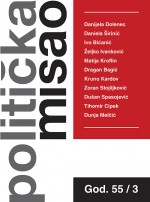Smisao univerziteta: Heideggerov ambivalentni odnos prema univerzitetu
Heidegger’s Equivocal Attitude to University
Author(s): Dunja MelčićSubject(s): Philosophy, Higher Education , Fascism, Nazism and WW II, History of Antisemitism
Published by: Fakultet političkih znanosti u Zagrebu
Keywords: Heidegger; University; “New Beginning”; Nazism; Will;
Summary/Abstract: It is fair to say that university as idea was Heidegger’s lifelong obsession. Young Heidegger believed that the power of education would become a generator of change. At the beginning this still was thought in the realm of Christianity and orthodox Catholicism of his heritage. It meant modern scientific scrutiny in the search for truth that was supposed to be real Christian truth. The most modern method of philosophy at the time was (Husserl’s) phenomenology, which Heidegger was using for critical examination of the tradition in European philosophical, metaphysical thought. After the catastrophe of the Great War Heidegger, who was already teaching at the university, saw an urgent necessity of a radical turn from the traditional university to a completely new beginning starting with reflection on the first awakening of the quest about the being as such in ancient Greece. While this is no more than fantastic fancy, the true change and potentially new beginning was what he was doing at the university: his formidable lecturing and teaching, his profound and nevertheless down-to-earth thinking, his prolific pragmatic philosophy, its modern approaches and horizons-opening methods. In his striving for complete change of university Heidegger was taking his concrete existence and doings for granted. He did not give them a thought, instead he started to believe that nationalistic and antisemitic demolishing of the ‘old world order’ and fossilized institutions should just be the proper moment for the revolution of university and academic education to start. Until Heidegger had taken his rectoral post at the University of Freiburg (1933) and delivered his famous inaugural speech, nobody knew about his concept of ‘completely new university’, but he nevertheless believed that it should fit to the party schemes of ‘national- socialist university’. The fundamental notion in this concept of university revolution is the “Will” (der Wille), though assumed will. After the debacle of this shameful episode Heidegger still kept fantasizing about the other university, though skipping silently the ‘category’ of will; at the same time he was castigating himself for that political engagement – as is now known from the notorious “black notice-book” (2015). But no sincere analysis of the matter can be found in these private notices, rather all of these self-reflections end up in self-pitying à la: not that his concept was wrong, but the time was not right. Being a part of the criminal, murderous regime did not even emerge to his mind as a problem. That’s the true reason for the notorious silence in the public about his guilt or at least responsibility during the Nazi regime. In the focus of this article is also Heidegger’s twofold nature, not to say duplicity, which it sometimes was, too. This has many facets, but just comparing the language in texts of his Nazi-speeches and private notes on the one hand and his philosophical lectures and writings on the other, it becomes obvious that the two sides of Heidegger are deeply and totally irreconcilable. On their own they would be utter opposites; being parts of one person they constitute a paradox called Martin Heidegger. After he was sanctioned with deprivation of the licence to teach, Heidegger suffered a real trauma; what he was so bitterly missing was his active life, teaching and lecturing at the real existing university, not the imagined one he kept yearning for. Such too is the chasm that can be observed between Heidegger’s critique of university’s liberal spirit on one hand and the essential gains he had in his life exactly from this liberal new age spirit and the university as the modern institution and the only (precarious) possibility of free thinking since the time of early Greek thinkers on the other.
Journal: Politička Misao
- Issue Year: LV/2018
- Issue No: 03
- Page Range: 146-177
- Page Count: 32
- Language: Croatian

